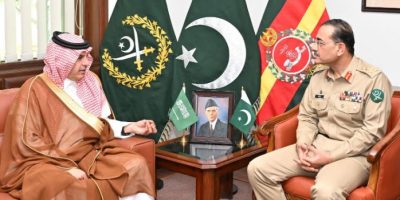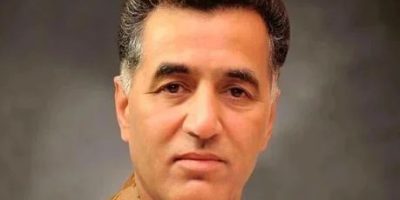American Ambassador Paul Jones defends Alice Wells’ statement on CPEC

LAHORE – United States Ambassador to Pakistan Paul Wayne Jones has responded to Pakistan’s refutation of U.S. Principal Deputy Assistant Secretary of State for South and Central Asia Alice Wells’ statement about the China-Pakistan Economic Corridor (CPEC), and said her statement was in accordance with the U.S. foreign policy.
“Pakistanis should understand Alice Wells’ statement […] her statement should be taken positively,” the ambassador said in his talk to the media while visiting Lahore’s Wazir Khan Mosque.
“Different aspects of this statement needed to be understood […] the U.S. wants to observe development and prosperity in Pakistan,” he added.
Meanwhile, Foreign Office Spokesperson Dr Muhammad Faisal said the people and government of Pakistan would carry forward the CPEC projects for prosperity of the region.
Talking to a private news channel, he said the economic corridor “is a colossal engine for generating employment, alleviation of poverty and betterment of economy.”
In reply to a question about U.S.’ reservations over the project, he said Pakistan would never become part of economic wars of the two global powers.
The spokesperson said Pakistan would not move back regarding the economic corridor at any cost and the entire nation would contribute in its development process.
To another question about the SAARC, he said India was the main hurdle in conducting its summit. He said without cooperation and interest of the neighboring country, the objectives of the organisation could not be achieved.
He mentioned that India should take interest for vitalising the SAARC summit so that issues of the region could be addressed in a proper manner.
The top U.S. diplomat for South Asia said the CPEC would profit only Beijing, adding that the United States offered a better model.
In a speech, described as “unusually specific” by the international media, the top U.S. diplomat for South Asia claimed that the multi-billion-dollar project would take a toll on Pakistan’s economy at the time of repayments and dividend in the coming years.
“CPEC’s most expensive single project is upgrading the railway from Karachi to Peshawar. When the project was initially announced, the price was set at $8.2 billion,” she said.
“In October of 2018, Pakistan’s railways minister announced that they had negotiated the price down to $6.2 billion, a saving of two billion. And he explained Pakistan is a poor country. We cannot afford this huge burden of these loans.”
“But recent media reports claim the price is now risen to $9 billion […] So, why doesn’t the Pakistani public know the price for CPEC’s most expensive project or how it’s being determined?”
She urged Islamabad to examine “the burdens that are falling on the new government to manage with now an estimated $15 billion debt to the Chinese government and $6.7 billion in Chinese commercial debt”.
Ms Wells emphasised the need for Pakistan to know that China was providing loans, not grants, as the United States.
“It’s clear or needs to be clear that CPEC is not about aid. This is almost always the form of loans or other forms of financing, often non-concessional with sovereign guarantees or guaranteed profits for Chinese state-own enterprises that are repatriated to China,” she said.
“Now, together with non-CPEC Chinese debts payments, China is going to take a growing toll on the Pakistan economy, especially when the bulk of payment starts to come due in the next four to six years.”
Ms Wells warned that even if loan payments were deferred, “they are going to hang over Pakistan’s economic development potential, hamstringing Prime Minister (Imran) Khan’s reform agenda.”
“CPEC relies primarily on Chinese workers and supplies, even amid rising unemployment in Pakistan,” she said.
“There is a different model,” she said. “Worldwide we see that US companies bring more than just capital; they bring values, processes and expertise that build the capacities of local economies.”
Apparently, her speech is aimed towards taking a major offensive that Washington has recently launched against Beijing’s Belt and Road Initiative, a signature project of Chinese President Xi Jinping, which aims to build ports, highways and railways around the world.
Related News

Saudi Arabia acknowledges Pakistan army’s contributions to regional peace and stability
Rawalpindi, APR 19 /DNA/ – Major General (Engineer) Talal Bin Abdullah Al-Otaibi, Assistant Minister ofRead More

Pak Army starts inquiry against ex-DG ISI
DNA ISLAMABAD: Pakistan Amry has constituted an inquiry committee to probe charges against former DGRead More


Comments are Closed